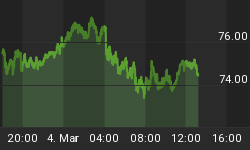As we spring from the financial armageddon that was 2008, market sentiment has been swinging as wildly as Charlie Sheen's public persona. One week the sky is falling in Europe - the next it's a Fed induced panacea a trader would be foolish to ignore. And yet throughout the tumult and bipolar emotional spasms that have become as commonplace as a Charlie Sheen meltdown, the market continues to demonstrate all the characteristics and innuendo we have come to understand is Winning.
I find myself asking a few basic questions.
Namely, what can we make out of market sentiment these days, and does it need to be reframed within a broader context to glean any worthwhile perspective, and;
Could market sentiment be far more balanced today than it currently represents, because it has become less of a binary reflection of the market and more of a summation of interests?
Anecdotally, you could look at the trajectory of Zero Hedge's popularity within the investor zeitgeist as a testament to the underlying skepticism towards this market. Being a curious fellow, I have checked their estimated market value from time to time (based only on daily pageview analytics) and found it doubles every few months. At the end of 2009 the site was estimated to be worth a little over $100K - a meteoric rise in of itself for a new market site. Today, it's approaching $1 million.

Google Trends - Zero Hedge
This rise has taken place solely on the backs of skeptical investors that have embraced the bearish dogma Zero Hedge propagates on a daily basis. This is even more impressive considering the market has rebuffed much of their market strategies and perspectives (*with the strong exception to the precious metals sector) over the past two years. You could say the Google Trend chart for Zero Hedge expresses both the market's literal Wall of Worry - and the double meaning that defines a bear today - I'm bearish towards equities with a big *caveat.
If the Investor Intelligence survey of the previous week found only 15.7% of advisors were bearish, and yet the majority of those advisors were still riding the strongest market sector, that just happens to be the bearish safehaven of gold and silver - isn't it misrepresenting the underlying market sentiment?
Considering this has been a rising tide lifts and drowns all asset classes (i.e. commodities, stocks & bonds), should traders simply ignore the previous historical analogs for these data series, or should there be an aggregate sentiment indicator that represents the true market character we find today?
I believe that these weekly market sentiment figures, when applied to the broader indexes, are about as worthwhile as interpreting the monthly BLS employment reports. They typically are not that useful - but everyone still squawks about them and finds their predetermined expectations within the data slices.
With that said, the widely held contrarian perspective towards these sentiment surveys is now overlapping my own expectations for the market in the short to intermediate time frames. I just arrived at those conclusions through different means.















